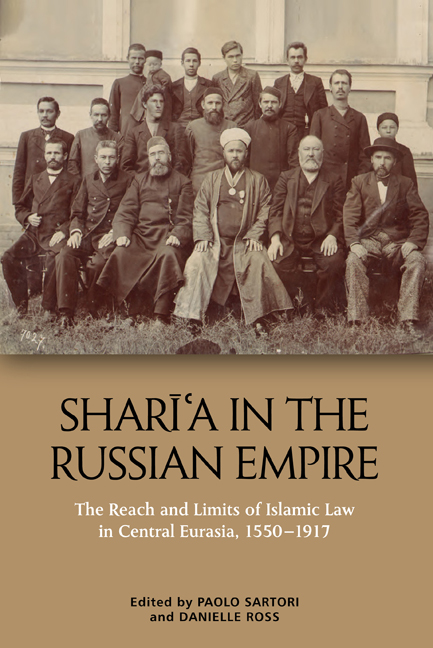Book contents
- Frontmatter
- Contents
- List of Contributors
- Introduction: The Reach and Limits of Sharīʿa in the Russian Empire, c.1552–1917
- 1 Islamic Education for All: Technological Change, Popular Literacy and the Transformation of the Volga-Ural Madrasa, 1650s–1910s
- 2 Taqlīd and Discontinuity: The Transformation of Islamic Legal Authority in the Volga-Ural Region
- 3 Debunking the ‘Unfortunate Girl’ Paradigm: Volga-Ural Muslim Women’s Knowledge Culture and its Transformation across the Long Nineteenth Century
- 4 Between Imperial Law and Islamic Law: Muslim Subjects and the Legality of Remarriage in Nineteenth-century Russia
- 5 Islamic Scholars among the Kereys of Northern Kazakhstan, 1680–1850
- 6 Tinkering with Codification in the Kazakh Steppe: ʿĀdat and Sharīʿa in the Work of Efim Osmolovskii
- 7 Taqlīd and Ijtihād over the Centuries: The Debates on Islamic Legal Theory in Daghestan, 1700s–1920s
- 8 Kunta Ḥājjī and the Stolen Horse
- 9 What We Talk about When We Talk about Taqlīd in Russian Central Asia
- 10 Take Me to Khiva: Sharīʿa as Governance in the Oasis of Khorezm (Nineteenth Century–Early Twentieth)
- Index
2 - Taqlīd and Discontinuity: The Transformation of Islamic Legal Authority in the Volga-Ural Region
Published online by Cambridge University Press: 22 September 2020
- Frontmatter
- Contents
- List of Contributors
- Introduction: The Reach and Limits of Sharīʿa in the Russian Empire, c.1552–1917
- 1 Islamic Education for All: Technological Change, Popular Literacy and the Transformation of the Volga-Ural Madrasa, 1650s–1910s
- 2 Taqlīd and Discontinuity: The Transformation of Islamic Legal Authority in the Volga-Ural Region
- 3 Debunking the ‘Unfortunate Girl’ Paradigm: Volga-Ural Muslim Women’s Knowledge Culture and its Transformation across the Long Nineteenth Century
- 4 Between Imperial Law and Islamic Law: Muslim Subjects and the Legality of Remarriage in Nineteenth-century Russia
- 5 Islamic Scholars among the Kereys of Northern Kazakhstan, 1680–1850
- 6 Tinkering with Codification in the Kazakh Steppe: ʿĀdat and Sharīʿa in the Work of Efim Osmolovskii
- 7 Taqlīd and Ijtihād over the Centuries: The Debates on Islamic Legal Theory in Daghestan, 1700s–1920s
- 8 Kunta Ḥājjī and the Stolen Horse
- 9 What We Talk about When We Talk about Taqlīd in Russian Central Asia
- 10 Take Me to Khiva: Sharīʿa as Governance in the Oasis of Khorezm (Nineteenth Century–Early Twentieth)
- Index
Summary
In 1910, a certain Aḥmad Fāʾiz Manṣūrov, imam in the village of Yaʿqūb near Ufa, published an article in the journal Dīn wa maʿīshat defending taqlīd as a religious necessity. He argued that following the canonical madhhabs – especially the Ḥanafī school, to which the overwhelming majority of Russia's Muslim subjects adhered – is essential for correct Islamic belief and practice.
In many respects, the appearance of such a full-throated defence of taqlīd in this period is not surprising. The history of Volga-Ural Muslims in the nineteenth century and early twentieth has long been character¬ised by the struggle between reformers and conservatives, with the latter strongly associated with taqlīd and an embrace of ijtihād the sine qua non of the former. Although dating from the very early Soviet period, this his¬toriographical framing remains prevalent in the academic literature, which tends to view this struggle through a social/cultural lens. In this light, Manṣūrūf's article, as an example of religiously based resistance to the modernist ethos pushed by reformers since the early nineteenth century, written by a member of the ʿulamāʾ and appearing in a major conservative newspaper, fully confirms this narrative.
From a different perspective, however, the article evinces an important – and frequently overlooked – shift in the debate over taqlīd and ijtihād. While we may accept it as representative of conservatism at the time, profound transformations to Islamic law had occurred in the region since the late eighteenth century. These eventually gave rise in the revolution¬ary period (1905–22) to a new context with unique dynamics at work. Particularly at issue was the makeup of Islamic religious and legal author¬ity, the construction and exercise of which were subject to significant alteration, most notably by the introduction by the Russian government of an official hierarchy for ʿulamāʾ. Taqlīd and ijtihād are inextricably linked with authority, and the terms and contours of debates surrounding them similarly shifted over time. Thus, rather than merely repeating a well-known view, Manṣūrov's article, in fact, offers a glimpse into how legal discourse had changed. His position, therefore, cannot be projected back onto earlier debates. This raises questions about the ostensible strug¬gle between conservatives and reformers, as well as its historiographical salience (especially for the study of Islamic law).
- Type
- Chapter
- Information
- Shari'a in the Russian EmpireThe Reach and Limits of Islamic Law in Central Eurasia, 1550-1917, pp. 81 - 119Publisher: Edinburgh University PressPrint publication year: 2020



